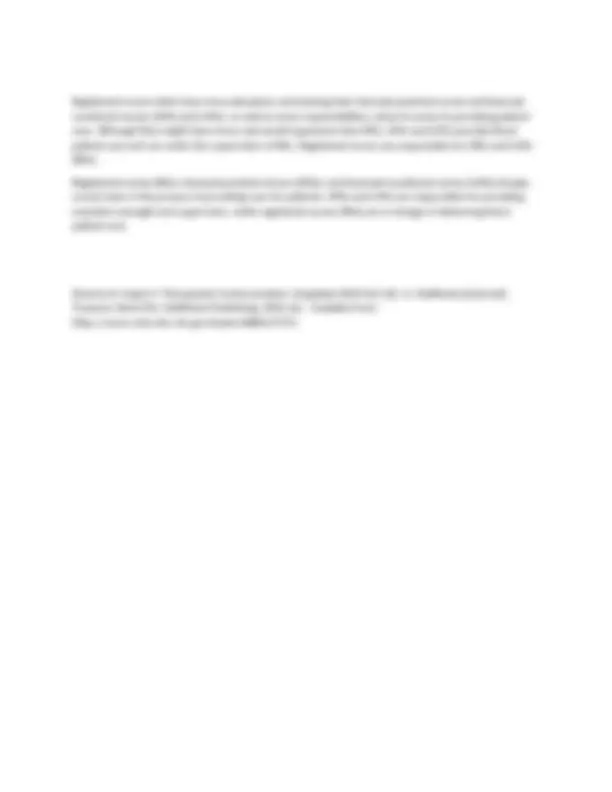



Study with the several resources on Docsity

Earn points by helping other students or get them with a premium plan


Prepare for your exams
Study with the several resources on Docsity

Earn points to download
Earn points by helping other students or get them with a premium plan
Community
Ask the community for help and clear up your study doubts
Discover the best universities in your country according to Docsity users
Free resources
Download our free guides on studying techniques, anxiety management strategies, and thesis advice from Docsity tutors
Nursing 101 Module 3 Document As a newly licensed RN, caring for Chris and Pat, use the nursing process and your newly acquired critical thinking skills to identify the most relevant and important information in this situation. Highlight your key areas of concern.
Typology: Essays (university)
1 / 2

This page cannot be seen from the preview
Don't miss anything!


As a newly licensed RN, caring for Chris and Pat, use the nursing process and your newly acquired critical thinking skills to identify the most relevant and important information in this situation. Highlight your key areas of concern. I want to examine Chris's issue first before turning my attention to Pat. In order to identify how I may best help him, I'd like to ask leading questions, as Taylor and colleagues assert (2019). Why is he so eager to go home? I'd like to know. What does he mean when he says that his "sweetheart" needs him, though? How dependent is she on him? I have all the data I need to assess Chris's susceptibility to delayed wound healing as a result of taking on too much too soon. As a nurse, if I observed Chris struggling to stand and walk, I would reassure him that taking painkillers will make him feel better and be more mobile. I would like to inform him about the benefits of using even non-narcotic painkillers or anti-inflammatory drugs to help him. Chris needs to understand the whole nature of his procedure, so I'll go over what was done and how long the doctor anticipates it will take him to recover. So that Chris won't have to worry as much about returning home to his "sweetheart," I'd like to ask Pat and Chris if they have any family members who would be ready to help them out while Chris is recovering from surgery. If no family is close by, I would ask the social worker about any services like home health care and meals on wheels that would be able to help them. Pat will find it challenging to take care of herself because she has hand tremors and obvious short-term memory loss. If they could make arrangements for Pat to get care at home, Chris would have one less item to stress over and push himself toward. He can recover more rapidly if he can rest well knowing Pat is getting care at home. The body's capacity to heal wounds properly is significantly impacted by stress, which also slows down wound healing (Christian et al., 2006). As an LPN/LVN, describe the next steps you would take to communicate your concerns for Chris and Pat. Then put yourself in the role of the RN. Describe how you would proceed in taking care of Chris and Pat Pender. LPNs and LVNs have a drastically different function than registered nurses when it comes to delivering care for patients (RNs). The fact that RNs have completed a higher degree of school and training is one of the most obvious differences between RNs and LPNs/LVNs. Registered nurses (RNs) have extra duties related to patient care. In addition to other members of the healthcare team, these duties also include assessing patients, creating care plans, and managing licensed practical nurses (LPNs) and licensed vocational nurses (LVNs). Moreover, RNs frequently have more decision-making power than LPNs and LVNs do. Registered nurses (RNs) would be in charge of a number of duties when it comes to providing care for Chris and Pat Pender, including assessing the patients' ailments, creating treatment plans, and managing licensed practical nurses (LPNs) and other members of the healthcare team. Licensed Practical Nurses and Licensed Vocational Nurses (LPNs and LVNs), on the other hand, would be in charge of tasks including giving direct patient care, dispensing medication, and gathering information.
Registered nurses often have more education and training than licensed practical nurses and licensed vocational nurses (LPNs and LVNs), as well as more responsibilities, when it comes to providing patient care. Although they might have more real-world experience than RNs, LPNs and LVNs provide direct patient care and are under the supervision of RNs. Registered nurses are responsible for LPNs and LVNs (RNs). Registered nurses (RNs), licensed practical nurses (LPNs), and licensed vocational nurses (LVNs) all play crucial roles in the process of providing care for patients. LPNs and LVNs are responsible for providing essential oversight and supervision, while registered nurses (RNs) are in charge of delivering direct patient care. Sharma N, Gupta V. Therapeutic Communication. [Updated 2022 Feb 10]. In: StatPearls [Internet]. Treasure Island (FL): StatPearls Publishing; 2022 Jan-. Available from: https://www.ncbi.nlm.nih.gov/books/NBK567775/